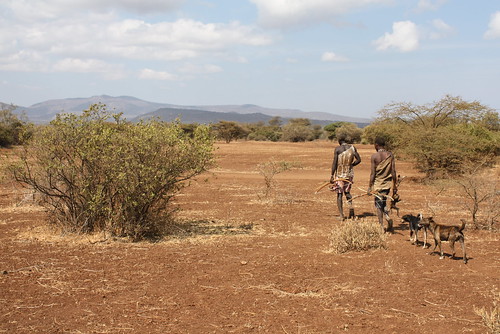Want to eat a diet that mimics that of our Paleolithic ancestors? It might be a little more complicated than what the popular books say.
The fact is, there was never one Paleo Diet; it's more likely there were hundreds of them and that they were continually changing and broadening over evolutionary time.
That was the overarching message of an impressive lineup of experts on ancient human diets at a symposium entitled "The Evolution of Human Nutrition" organized by the Center of Academic Research and Training in Anthropogeny (CARTA) at UC San Diego on December 7, 2012.
Now, I'm happy to report, the videos of a few of the talks have been made available (embedded in this post below). You can also read what other folks on Twitter had to say about the event using the #CARTAsymp hashtag in my Storify story.
Eyeing the world of food, nutrition, and medicine through the lens of evidence and evolution.
Showing posts with label human evolution. Show all posts
Showing posts with label human evolution. Show all posts
11 February 2013
02 December 2012
Why you can all stop saying meat eating fueled evolution of larger brains right now
 |
| Hadza returning from hunt in Tanzania. Credit Andy Lederer. |
On November 15th's episode of The Colbert Report, Stephen Colbert interviewed one of the world's foremost paleoanthropologists, Chris Stringer of the Natural History Museum, about his newly published book. During their conversation, Stringer sums up nicely why meat eating may have been the primary force that drove evolution of a brain-gut tradeoff, where a shrinking gut allowed for more energy input into the brain. Here is Stringer's explanation at about minute 18:30 in the episode:
Chris Stringer: "There's a thing called 'expensive tissue hypothesis'. And this says we evolved our large brains by changing our diets. Our ancestors had great big guts because they were vegetarian. They never had enough spare energy because their guts were using 20 percent of their energy; they never had enough spare energy to evolve a large brain. When we started eating meat, a much more concentrated sort of food, it freed up energy and we could start to run a bigger brain."
Stephen Colbert: "That's why vegetarianism seems so stupid to me."
11 November 2012
Human vs. chimps: What the "regulome" tells us about meat eating & bigger brains
 |
| Source: Greg Wray |
The savanna would mean a new way of life for our ancestors. They'd learn to use tools, communicate with each other using language, and work together to hunt animals for food. Based on fossil evidence and stable isotope data, our hominin ancestors shifted to a diet where meat was a principal energy source about two million years ago. It would be a major shift in diet that coincided with an increase in cranial capacity.
Now, scientists like Greg Wray, a professor of biology at Duke University, are beginning to better understand the genetic basis for the adaptation to eating meat and how it guided the development of our larger brains. During his plenary talk at the Council for the Advancement of Science Writing's (CASW) "New Horizons in Science 2012" annual conference in Durham, North Carolina, Wray said that the Encyclopedia of DNA Elements (ENCODE) project gave scientists like himself a "detailed street map" for seeking out the genetic changes that took place since the divergence of humans and chimpanzees over evolutionary time.
Subscribe to:
Posts (Atom)
